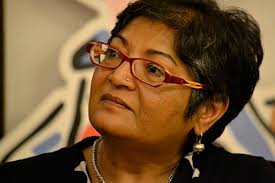 by International Truth & Justice Project Sri Lanka, South Africa & UK, July 2015
by International Truth & Justice Project Sri Lanka, South Africa & UK, July 2015
Full report [PDF] — Stop-Torture-Report
Original [PDF]
‘The Diplomat’ commentary by Taylor Dibbert
Executive Summary
This report paints a disturbing picture of a multifaceted assault of terror still wreaked in 2015 on Tamil families by the security forces in the former conflict areas of Sri Lanka. The findings are based on the testimony of survivors of illegal state-organised abduction in “white vans” by the security forces. The most recent incident occurred in July 2015. The victims of these abductions experienced repeated sexual torture and/or torture and then fled the country. As a result they are victims who are not widely known about inside Sri Lanka even by human rights activists there who courageously assist victims of arbitrary detention and torture.
Increasingly the Tamil victims have not just suffered one isolated instance of abuse. Several have been detained on multiple occasions and/or their family members have been detained, disappeared or killed. Not to mention that a large number survived the final terrible months of the civil war in 2009, as well as decades of prior displacement and loss. Among the 180 cases documented in this report, the pattern is that the young are detained, tortured and raped, the elderly forced into debt to save them, while none can safely exercise even their most basic rights or feel safe. The on-going harassment and intimidation of the families in Sri Lanka of torture survivors who have fled abroad has continued unabated throughout 2015.
The structures of cruelty used for this ethnic persecution, political repression, extortion and revenge have not been dismantled six years after the war ended. There continues to be a thriving torture industry amounting to state run organised crime by sections of the security forces in Sri Lanka, seemingly unaffected by the change of politicians at the helm. Its continuation does not necessarily mean the security forces are out of the control of the politicians, rather that the politicians have simply not tried to curb them. Nor have international initiatives thus far, including the UN Investigation into Sri Lanka, been successful in stopping the on-going serious violations against Tamils by the security forces.

Yasmin Sooka
Impunity is so entrenched that ITJP has identified forty-one sites in Sri Lanka where victims state they were tortured after the war, as well as numerous alleged individual perpetrators of war crimes, rape, torture and execution. This is the result of painstaking research and cross-referencing new evidence from security force insiders with the testimony of survivors including some of the one hundred “white van” abductions we have documented that took place after the war ended.
We reveal the GPS coordinates for the secret naval intelligence detention facility in Trincomalee Naval Dockyard, and also possess names and photographs of torturers and guards who worked there. In Vavuniya, Joseph Camp was the base for military intelligence “white van” abduction teams and a site where multiple victims were tortured and sexually abused; we have multiple names and photographs of torturers who worked there, as well as other sites island wide. However the 41 sites we have identified represent only a fraction of the total number of torture sites in Sri Lanka because many witnesses have no idea where they were tortured, having been blindfolded when transferred there and out.
The victims cannot be looked at in isolation from their families, who continue to suffer reprisals even after one member is driven out of the country. More than a quarter of torture survivors interviewed abroad said a close relative back home had been subjected to physical violence, including beatings, torture, rape and in some cases killing, after they had fled the country. These violations occurred at the end of the war and continues to the present day.
The findings of this report should raise red flags about any domestic accountability process for Sri Lanka. Witness safety simply cannot be guaranteed at present. International organisations, including the United Nations, have offered technical assistance to the government on addressing human rights violations and accountability need to take cognisance of the findings of this report regarding ongoing violations by the security forces. The proposed UN involvement envisages consultations with law enforcement agencies that are not just responsible for past violations, but are alleged to be still committing crimes and attempting to silence witnesses.
The report is based on:
– 180 cases of post-war torture and/or sexual violence in Sri Lanka.
– From which ITJP has recorded 115 statements from witnesses and survivors. Of these, 100 are “white van” abduction survivors.
– These cases include eight accounts of torture and sexual abuse that occurred after 8 January 2015, and fourteen cases that occurred in 2014.
– 84 witnesses were asked about reprisals against their families.